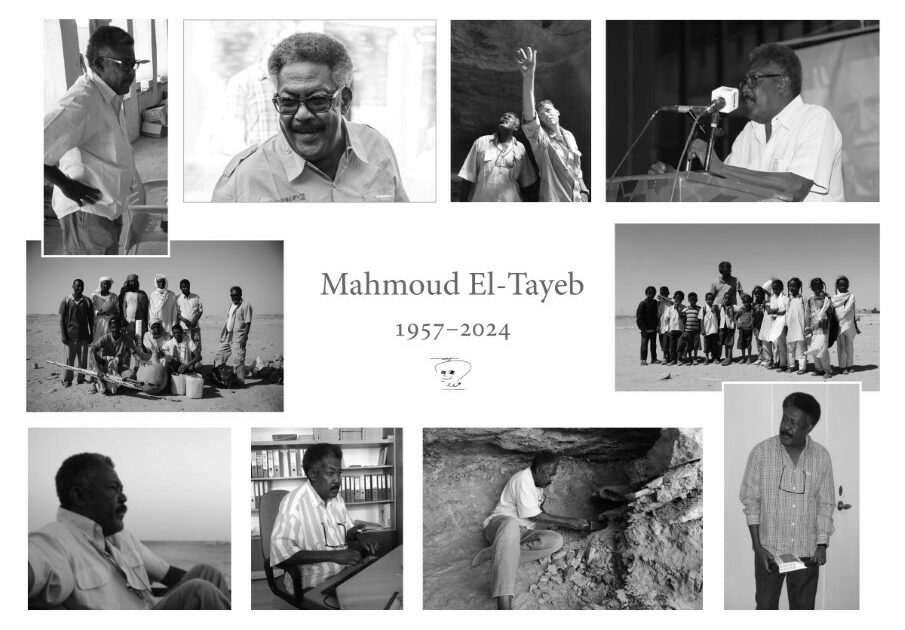Professor El-Sheikh Mahmoud El-Tayeb was an archaeologist specializing in the archaeology of Sudan, with a particular focus on the Meroitic period (300 BC–350 AD) and the Makurian period (600–1400 AD).
He was born in Gedaref, Sudan, and came to Poland in 1975 on a scholarship from the International Union of Students to begin his master’s studies at the University of Warsaw. Before that, he completed a one-year course at the Institute of Polish Language at the University of Łódź.
He graduated from the Institute of Archaeology at the University of Warsaw in 1982, defending his master’s thesis “History of Excavations in the Sudanese Nubia, from A to X-Group Period” under the supervision of Prof. J. Lipińska. He then returned to Sudan, where he worked from 1983 to 1990 as an inspector in the Sudan Antiquities Service, in the Fieldwork Section. During this time, he participated in numerous Sudanese and international archaeological projects, including in el-Hobagi, where he collaborated with Patrice Lenoble, whom he considered the most important of his teachers, dedicating his later publications to him.
From 1990 to 1995, he undertook doctoral studies at the Institute of Archaeology at the University of Warsaw, earning his PhD with a dissertation titled “Genesis of the Makurian Culture, in the Light of Archaeological Sources,” prepared under the supervision of Prof. W. Godlewski. In 2013, he achieved his habilitation based on his mongraph “Burial Traditions in Nubian Early Makuria.” In the spring of 2024, he obtained the position of University of Warsaw professor.
From 1996 to 2009, El-Tayeb worked as an assistant and adjunct at the Institute of Archaeology, University of Warsaw, teaching courses on Sudanese archaeology and Arabic for archaeologists. He also lectured on the history of Egypt and Nubia at the Faculty of History at the University of Gdańsk (1997–1998). He enjoyed great popularity among his students. Concurrently, from 1997 to 1999, he served as a senior curator at the Archaeological Museum in Gdańsk, also participating in the museum’s research in the Bayuda region of Sudan.
Since 2009, he had been working at the Polish Centre of Mediterranean Archaeology at the University of Warsaw, where in 2018 he was appointed head of the newly established Research Centre in Khartoum.
Prof. El-Tayeb participated in numerous archaeological expeditions in Sudan and Lebanon. In the Lebanese province of Iqlim el-Kharroub, he headed a survey project from 1999 to 2013). For over 20 years, he also directed his own research projects in Sudan. As part of the “Early Makuria Research Project” (2004–2023), he investigated extensive tumulus cemeteries at sites such as El-Zuma, El-Detti, and Tanqasi, located in the Gebel Barkal area, which is listed as a UNESCO World Heritage Site.
Prof. El-Tayeb was a member of several international scientific organizations (International Society for Nubian Studies, the Sudan Archaeological Research Society, the Society for Africanist Archaeologists, the Sudanese Archaeological Society). He published dozens of articles and chapters in scientific publications, as well as monographs dedicated to the results of his research projects. He also translated scientific and popular science texts into Arabic.
Popularization and cooperation with local communities were his great passions. For many years, he shared the results of his research and his knowledge of archaeology with local residents, students from local schools, universities, and even football teams. He also met with Polish schoolchildren and students. He supported young archaeologists in Sudan and Poland, helping them develop and find their scientific paths. With his attitude, professional passion, and storytelling gift, he conveyed much more than just knowledge about archaeology – he could bring people together regardless of nationality and background.
The outbreak of fighting in Sudan in the spring of 2023, which forced him to evacuate from Khartoum with his wife and daughter, as well as the ongoing bloody battles and destruction since then, broke his heart.
He passed away on 12th June, 2024. He was buried in the Tatar Muslim Cemetery in Warsaw at Tatarska Street 8.
His impact on Nubian Studies in Poland and worldwide is immeasurable. He is survived by his wife, daughter, and son, as well as numerous friends both in Poland and around the world, who will remember him as an outstanding scientist and an extraordinary human being.


